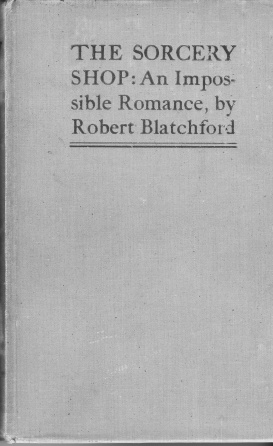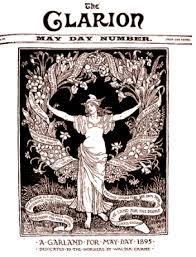
In the Days of The Comet takes us down one path, a narrative of a love triangle, but then half way through unexpectedly races off down another.
In the short prologue we are introduced to an old man who tells us, “I have set myself to write the story of the Great Change, so far as it has affected my own life and the lives of one or two people closely connected with me, primarily to please myself.” The narrative that follows is therefore peppered with his comments from the perspective of the future.
You must understand--and every year it becomes increasingly difficult to understand--how entirely different the world was then from what it is now. It was a dark world; it was full of preventable disorder, preventable diseases, and preventable pain, of harshness and stupid unpremeditated cruelties; but yet, it may be even by virtue of the general darkness, there were moments of a rare and evanescent beauty that seem no longer possible in my experience. The great Change has come for ever more, happiness and beauty are our atmosphere, there is peace on earth and good will to all men. None would dare to dream of returning to the sorrows of the former time, and yet that misery was pierced, ever and again its gray curtain was stabbed through and through by joys of an intensity, by perceptionsof a keenness that it seems to me are now altogether gone out of life. Is it the Change, I wonder, that has robbed life of its extremes, or is it perhaps only this, that youth has left me--even the strength of middle years leaves me now--and taken its despairs and raptures, leaving me judgment, perhaps, sympathy, memories?
The old man is Willie Leaford, fifty years ago a young man living in the Potteries, a socialist angry at the world who is love with Nettie. Leaford loses his job while Nettie throws him over for Edward Verrall, a wealthy young man, and they elope.
I had grown so accustomed to think of Nettie as inseparably mine--the whole tradition of "true love" pointed me to that--that for her to face about with these precise small phrases toward abandonment, after we had kissed and whispered and come so close in the little adventurous familiarities of the young, shocked me profoundly. I! I! And Rawdon didn't find me indispensable either. I felt I was suddenly repudiated by the universe and threatened with effacement, that in some positive and emphatic way I must at once assert myself. There was no balm in the religion I had learnt, or in the irreligion I had adopted, for wounded self-love.
Willie buys a revolver and pursues them to the coast. So far so conventional. But these personal events are taking place against a background of two momentous events.
Firstly, the approach to the earth of a comet:

...the comet which had been on the first occasion only a dubious speck in the sky, certainly visible only when it was magnified, was now a great white presence, brighter than Jupiter, and casting a shadow on its own account. It was now actively present in the world of human thought, every one was talking about it, every one was looking for its waxing splendor as the sun went down--the papers, the music-halls, the hoardings, echoed it.
Leaford, in conversation with his fellow socialist Parload, invokes the comet:
We were presently abroad, walking through the warm summer's night and talking all the more freely for that. But one thing that I said I can remember. "I wish at times," said I, with a gesture at the heavens, "that comet of yours or some such thing would indeed strike this world--and wipe us all away, strikes, wars, tumults, loves, jealousies, and all the wretchedness of life!"
Secondly, the outbreak of war with Germany in which battleships fight each other along the very coast where Leaford is in pursuit of the lovers:
On, on! I groaned with the violence of my effort. I staggered again and swore. I felt the concussions of great guns tear past me through the murk. They were gone! Everything was going, but I kept on running. Once more I stumbled. There was something about my feet that impeded me, tall grass or heather, but I could not see what it was, only this smoke that eddied about my knees. There was a noise and spinning in my brain, a vain resistance to a dark green curtain that was falling, falling, falling, fold upon fold. Everything grew darker and darker. I made one last frantic effort, and raised my revolver, fired my penultimate shot at a venture, and fell headlong to the ground. And behold! the green curtain was a black one, and the earth and I and all things ceased to be.
The whole of humanity is put to sleep by a green gas created by the comet. Leaford awakes after several hours:
What was this place? How had I come to be sleeping here? I could not remember. It perplexed me that somehow my body felt strange to me. It was unfamiliar--I could not tell how--and the barley, and the beautiful weeds, and the slowly developing glory of the dawn behind; all those things partook of the same unfamiliarity. I felt as though I was a thing in some very luminous painted window, as though this dawn broke through me. I felt I was part of some exquisite picture painted in light and joy.
The comet gas wipes away the desire for violence and war, for competition and even for countries. A world state is created, while the old grimy smoke-ridden cities are torn down and rebuilt for beauty alone.
All these vast cities have given way and gone, even as my native Potteries and the Black Country have gone, and the lives that were caught, crippled, starved, and maimed amidst their labyrinths, their forgotten and neglected maladjustments, and their vast, inhuman, ill-conceived industrial machinery have escaped--to life. Those cities of growth and accident are altogether gone, never a chimney smokes about our world to-day, and the sound of the weeping of children who toiled and hungered, the dull despair of overburdened women, the noise of brute quarrels in alleys, all shameful pleasures and all the ugly grossness of wealthy pride have gone with them, with the utter change in our lives. As I look back into the past I see a vast exultant dust of house-breaking and removal rise up into the clear air that followed the hour of the green vapors, I live again the Year of Tents, the Year of Scaffolding, and like the triumph of a new theme in a piece of music--the great cities of our new days arise. Come Caerlyon and Armedon, the twin cities of lower England, with the winding summer city of the Thames between, and I see the gaunt dirt of old Edinburgh die to rise again white and tall beneath the shadow of her ancient hill;
The gas hasaslo wiped away jealousy, and Willie becomes friends with Nettie and Edward. In time Willie begins a relationship with Anna and they have a child. But towards the end of the novel Nettie comes to him, and they recognise that they are still in love. She suggests a new kind of relationship in which the two couples share a home: “… we four from that time were very close, you understand, we were friends, helpers, personal lovers in a world of lovers.”
This is the part of the novel that shocked some Edwardian readers, and even some members of the Fabian Society of which Wells was a leading figure,
Strip away the love triangle and In the Days of the Comet boils down to a vehicle for Wells to advance his critique of early C20th industrial capitalism and his remedies eg the world state, a notion that he was to return to in later novels and other writings. The first half of the novel has life , whereas the second half is curiously lifeless, a common fault of Utopian novels I have discovered.
You can read the novel online here.
Adam Roberts has written a short sequel to the novel called In the Night of the Comet in which a second comet reverses the changes. Oh dear…
The old man i
 In Men Like Gods H G Wells takes us to his vision of Utopia. He follows in the wake of a number of other Utopian novels by socialists including Looking Backward by Edward Bellamy, News from Nowhere by William Morris,
In Men Like Gods H G Wells takes us to his vision of Utopia. He follows in the wake of a number of other Utopian novels by socialists including Looking Backward by Edward Bellamy, News from Nowhere by William Morris, 

 theory of “economic justice” but upon humanity and common sense.
theory of “economic justice” but upon humanity and common sense. They pass Hulme Town Hall, now “a marble place with high towers” and make their way into the city along Chester Road, as the wizard tells them:
They pass Hulme Town Hall, now “a marble place with high towers” and make their way into the city along Chester Road, as the wizard tells them: They enter Fountain Square:
They enter Fountain Square: ost part, the ill-clothed, rough-spun men of the labouring class, with here and there a better-dressed artisan. Their boots were down at heel, their hands were coarse, their faces grimy and weather-beaten. They tramped on silently, looking straight before them, or on the ground. They seemed dull and dispirited, but not angry or ashamed. With a strange stolidity of endurance, worthy of Oriental fatalists, they trudged along upon their hungry march through the wealth and ostentation of the indifferent West .
ost part, the ill-clothed, rough-spun men of the labouring class, with here and there a better-dressed artisan. Their boots were down at heel, their hands were coarse, their faces grimy and weather-beaten. They tramped on silently, looking straight before them, or on the ground. They seemed dull and dispirited, but not angry or ashamed. With a strange stolidity of endurance, worthy of Oriental fatalists, they trudged along upon their hungry march through the wealth and ostentation of the indifferent West .